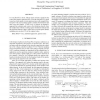Free Online Productivity Tools
i2Speak
i2Symbol
i2OCR
iTex2Img
iWeb2Print
iWeb2Shot
i2Type
iPdf2Split
iPdf2Merge
i2Bopomofo
i2Arabic
i2Style
i2Image
i2PDF
iLatex2Rtf
Sci2ools
ICASSP
2011
IEEE
2011
IEEE
Frequency domain compensation of spurious sidebands in A/D circuits
In a non-ideal PLL circuit, leakage of the reference signal into the control line produces spurious tones. When the distorted PLL signal is used as a clock signal, it creates spurious tones in the sampled data. Our prior work used a training signal to estimate the distortions and then correct the samples. In this work, we propose an alternative approach that estimates and removes the distortions directly from the sampled data without a training signal. Simulations indicate that the proposed solution is able to reduce the root-mean-square (RMS) sampling errors to about 15% of the original values.
| Added | 20 Aug 2011 |
| Updated | 20 Aug 2011 |
| Type | Journal |
| Year | 2011 |
| Where | ICASSP |
| Authors | Shang-Kee Ting, Ali H. Sayed |
Comments (0)

